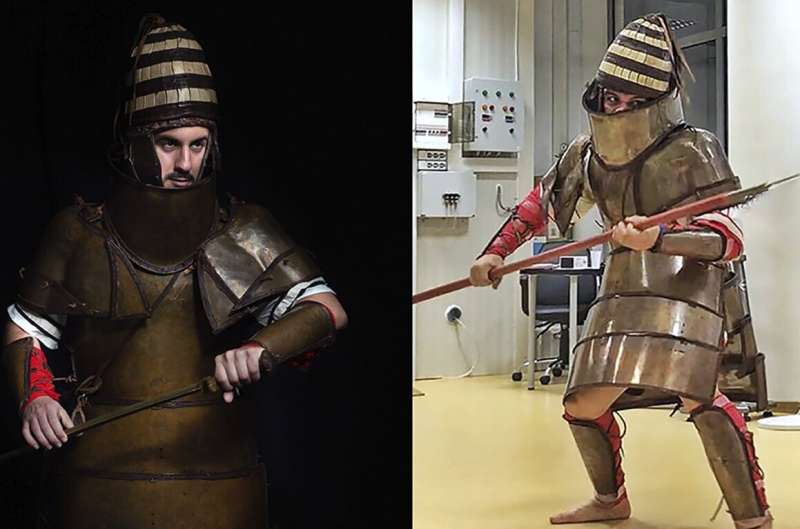May 25, 2024 report
This article has been reviewed according to Science X's editorial process and policies. Editors have highlighted the following attributes while ensuring the content's credibility:
fact-checked
trusted source
proofread
Saturday Citations: The cheapness horizon of electric batteries; the battle-worthiness of ancient armor; scared animals

Sometimes, science requires traveling into hazardous environments; sometimes it requires a vast influx of state capital and an army of researchers and technicians. But sometimes, science has to call in the Marines. We reported on that this week, along with news about a new cathode for electric batteries made from an Earth-abundant element that will stun you into silence, and the No. 1 fear of animals globally.
Empire of dirt
Human infrastructure is vast, so we prefer to make it from cheap materials, preferably dirt—so abundant and so negligibly valued that you can make someone mad by giving them a box of it. These days, we've been introducing prohibitively expensive rare earth materials like lithium into human endeavors, so scientists have begun considering: What if we could just make batteries out of dirt? Or at least abundant dirt elements like sodium or sulfur?
Researchers at Oregon State University are exploring the possibility of making batteries from iron, producing a cathode with higher energy density than the cathode materials in standard electric car batteries. The researchers note that manufacturers of lithium-ion batteries are hovering near the energy density ceiling beyond which a useful battery becomes a destructive bomb. And iron, at a buck a kilogram, would vastly reduce the materials cost of electric batteries.
Additionally, iron is cleaner, crumbling away into rust, so it doesn't require recycling. No other change is required to power existing electric batteries; just swap out the cathode material and as a notably cheap character from "Arrested Development" once said, "baby, you got a stew goin.'" The researchers note that improvements are required in storage efficiency, as not all the energy introduced to the battery is available on discharge, but they expect advancements to come rapidly.
Cosplay for science
In 1960, archaeologists found one of the oldest known suits of European armor near a village called Dendra, not far from ancient Mycenae, a military stronghold and a major center of ancient civilization. For decades, it has been unknown whether the armor was mostly ceremonial or if it was actually battle ready. Finally, after poking at it for over a half-century, somebody said, "Screw it, let's call the Marines."
The authors of a new study recruited 13 volunteers from the Marines of the Hellenic Armed Forces and dressed them up in replicas of the 3,500-year-old armor, equipping them with Bronze Age weapons and conducting a Bronze Age combat protocol based on historical accounts in Homer's Iliad. After 11 hours of simulated combat conditions, the Marines and the researchers concluded that the armor was battle-worthy, without limiting movement or fighting ability, or straining the soldiers. Pánta pistós! (That's Greek for "Semper Fi.")
It's electric! You can't see it [it's electric!] you gotta feel it [it's electric!]
NASA's Psyche spacecraft, bound for the asteroid belt, has entered "full cruise" mode, during which its groundbreaking electric thrusters take over, firing nonstop for the next year. Launched last October via SpaceX Falcon Heavy, it used the boost from the rocket to coast to Mars. Psyche's thrusters expel charged xenon ions, giving the craft an extremely photogenic blue glow.
The system is entirely powered by sunlight, creating the thrust pressure equivalent, according to the article, of holding three quarters in your hand. But over time, acceleration increases; the craft, now speeding along at 23 miles per second relative to Earth, will eventually reach 124,000 miles per hour. Its destination is right there on the label: the metal-rich asteroid Psyche, which it will spend two years observing.
Humans scary
Researchers at the University of Western Ontario report that kangaroos, wallabies and other Australian marsupials are more frightened by approaching humans than any other predator, including dogs, wolves and Tasmanian devils. This backs up findings from previous studies in North America, Europe, Africa and Asia reporting that the paramount fear of wildlife globally is humans. But all humans? Are lions scared of Paul Rudd? He seems really approachable.
Anyway, the researchers ventured into the eucalypt forest in Tanzania and found that marsupials were 2.4 times more likely to flee at the sound of human voices compared to the sounds of other predators.
"The very substantial fear of humans demonstrated here, and in comparable recent experiments, can be expected to have dramatic ecological consequences, because other new research has established that fear itself can reduce wildlife numbers, and fear of humans can cause cascading impacts on multiple species throughout entire landscapes," says Western University biology professor Liana Zanette.
© 2024 Science X Network





















